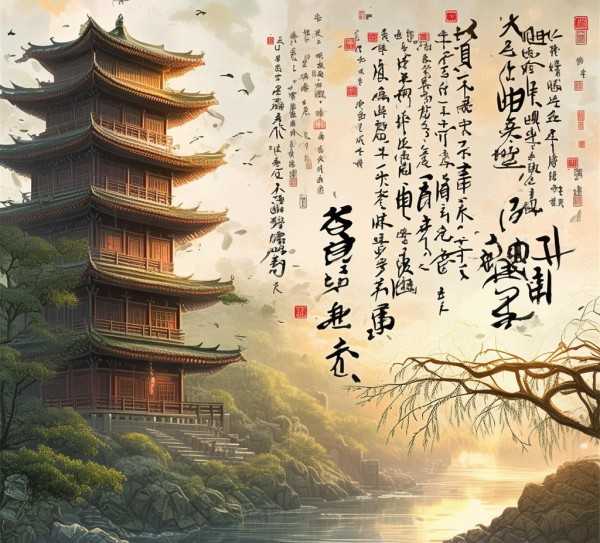
《岳楼记》作为北宋著名文学家范仲淹的传世佳作,收录在他著名的《范文正公集》中,此篇散文以岳楼为背景,通过对洞庭湖畔壮丽风光的细腻描绘,抒发了作者对国家兴衰和人生哲理的深刻感悟,以下是对《岳楼记》原文的解读与翻译。
原文解读:
昔日,孟尝君喜好待客,每逢宾客来访,必领其至楼台亭阁,观赏其美景,他命范仲淹挥毫泼墨,撰写一篇记文,以记其盛。
岳楼矗立于洞庭湖畔,登楼远眺,心旷神怡,无论荣辱,尽皆忘怀,把酒临风,那份悠然自得之情,仿佛无穷无尽。
此楼北连巫峡,南接潇湘,过往的官员与文人墨客,常在此相聚,观赏风景的心情,岂能不各有异样?
若遇连绵阴雨,数月不开,狂风怒吼,浊浪滔天;日月星辰隐匿光芒,山岳隐去真容;商旅停滞,帆樯倾覆;黄昏时分,虎啸猿啼,登楼之人,必怀乡恋国,忧惧谗言,满目凄凉,感伤至极。
而每当春风和煦,阳光明媚,湖面平静如镜,上下天光一片碧蓝;沙洲上的鸥鸟翩翩起舞,美丽的鱼儿在水中嬉戏;岸边的香草与汀上的兰花,郁郁葱葱,有时烟雾消散,皎洁的月光照耀千里,波光闪烁如金,月影沉入玉璧,渔夫歌声此起彼伏,此乐何极!
登楼之际,心旷神怡,宠辱皆忘,手持酒杯,迎风而立,那份悠然自得之情,真是令人陶醉。
唉!我曾探求古代仁者的心境,或许与这两种心情有所不同,这是为什么呢?不因外物而悲喜,不因个人得失而动容;在朝为官,忧虑百姓疾苦;退隐江湖,担忧国家安危,无论是进取还是退隐,心中都充满忧虑,那么何时才能感到快乐呢?他们或许会说:“先为人忧,后为已乐”吧!
唉!如果没有这样的人,我该归向何方呢?
时值六年九月十五日。
翻译:
In days gone by, Lord Mengchang, a patron of guests, would lead them to visit his pavilions and terraces whenever they came to his court, to appreciate their beauty. Thus, he commanded Fan Zhongyan to write a memorial essay to record the grandeur of the scene.
The Yuelou stands by the banks of Dongting Lake. When one ascends this tower, one feels at ease, forgetting all about honor and disgrace. Holding a cup of wine, facing the wind, the feeling of joy seems boundless.
However, this tower is connected to the Wuxia Gorge to the north and Xiangxia to the south. Past officials and literati often gather here to enjoy the scenery, and their feelings about the view can't be the same.
If it's a time of continuous rain and fog, months without end, with fierce winds roaring and murky waves surging, the sun and the moon hide their brilliance, the mountains and hills disappear, travelers are unable to move, sails and oars are overturned; at dusk, the roar of tigers and the cries of monkeys, those who ascend this tower must miss their country and homes, fear defamation and criticism, look around and feel desolate, sorrowful to the extreme.
But when the spring breeze is warm and the sun is bright, the lake is calm as a mirror, the sky above and the water below are a boundless blue; seagulls on the sandbars flutter, beautiful fish swim in the water; the fragrant grasses on the shore and the orchids on the islets are lush and green; sometimes the mist dissipates, the bright moon shines a thousand miles away, the sparkling ripples are like gold, the quiet moonlight sinks into the jade, the songs of the fishermen are answered back and forth, how endless is this joy!
When ascending this tower, one feels at ease, forgetting all about honor and disgrace. Holding a cup of wine, facing the wind, the feeling of joy seems boundless.
Alas! I have sought the hearts of ancient benevolent people, perhaps different from these two feelings, why is that? Not to grieve or be joyful because of external things, not to be moved by personal gains and losses; when serving in the court, worry about the sufferings of the people; when living in the rivers and lakes, worry about the king. Whether advancing or retreating, there is always worry in the heart. So when can one be happy? They might say, "Worry before others worry, and be happy after others are happy"!
Alas! Without such people, to whom shall I return?
It was on the 15th day of the ninth month of the sixth year.
Through the original text and translation of "The Yuelou Memoir," we can see Fan Zhongyan's deep concern for the fate of the country and his indifferent attitude towards personal circumstances. This essay not only showcases the beauty of the Yuelou but also reflects the author's noble character and great ambitions, making it an immortal classic in the history of literature.
未经允许不得转载! 作者:清风,转载或复制请以超链接形式并注明出处。
原文地址:http://www.dnhjvoc.com/post/357.html发布于:2025-07-09









